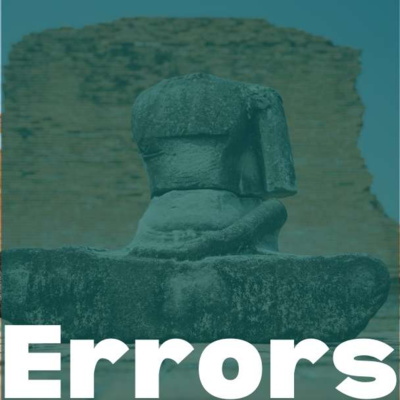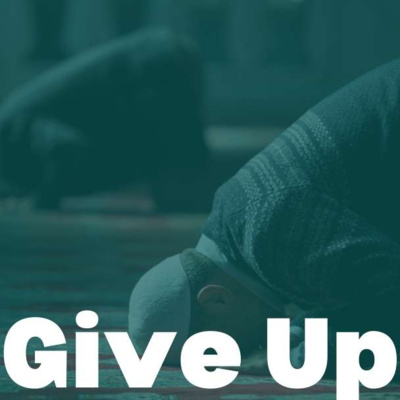Discover A Beautiful Thought
A Beautiful Thought

A Beautiful Thought
Author: A Beautiful Thought
Subscribed: 5Played: 346Subscribe
Share
© A Beautiful Thought
Description
Your life can improve simply by noticing how your life is already wonderful.
In this podcast, I'm going to draw your attention to things in your life that you can appreciate today, to help you feel happier and more inspired. I'm also going to interview people to discover their struggles, their own hero's journey, and the lessons they discovered that enriched their lives and might enrich yours.
In this podcast, I'm going to draw your attention to things in your life that you can appreciate today, to help you feel happier and more inspired. I'm also going to interview people to discover their struggles, their own hero's journey, and the lessons they discovered that enriched their lives and might enrich yours.
479 Episodes
Reverse
I welcome you to the final episode of A Beautiful Thought.
Looking around us, we might notice there are many strange inversions in the world. Things seem to be the exact opposite to what they’re supposed to be.
For example, once there were grand books telling stories that would appeal to the masses, and at once teach high spiritual ideas, such as the Mahabharata and its extract, the Bhagavad-Gita.
Now the popular stories we see seem to be mere backdrops to act as propaganda for powerful organizations such as BlackRock. The spiritual ideals are eliminated, the entertainment reduced, and the message they want to push is most prominent.
Another example is the concept of “mother”. In the tradition of yoga, once men would mentally refer to women as “Mother”, controlling their lust and attempting to see them as the Divine Feminine. Now in TikTok videos, young men leave comments calling attractive women “Mommy”, for quite another purpose.
We might say our innocence has been taken from us, or we might say that we willingly gave it up. But even in a world like this, our innocence can be regained. The solution can take time and effort, but it is simple.
By pursuing sexual continence, control of one’s own thoughts, and keeping God in mind, we can regain that innocence. Instead of moving deeper into the world, we move deeper into ourselves, into self-control, and into our own spirits.
The rewards are numerous, and perhaps they are even perfect.
(Read the transcript and find important links on the site: A Beautiful Thought – Purity Of Mind: Episode 480)
---
Send in a voice message: https://podcasters.spotify.com/pod/show/beautiful-thought/message
If you’re a verbal thinker, you’re likely a highly linear thinker. That can mean it’s easy for you to get stuck in a thought pattern.
One thought leads you to the next, then to the next, and then it leads you back to the first thought. As our brains operate with state-based memory, we may find more and more things that bother us.
Unable to perceive the overview of our mental patterns, we might stay like that for days, or possibly years.
One solution is meditation. When we take the time to observe our thoughts, we do gain that overview.
Another method is journaling. By putting our thoughts on a page, we can begin to recognise the patterns and the structure, and we can more easily find a way out.
(Read the transcript and find important links on the site: A Beautiful Thought – Getting Lost In Thought: Episode 479)
---
Send in a voice message: https://podcasters.spotify.com/pod/show/beautiful-thought/message
Often a memory will come to mind, and we get a glimpse of something we did. In that moment we might sense an incongruence.
We grasp for a sense of self, an idea that we had about who we were. That leads us to resist what actually happened. The inevitable result is suffering.
In fact, grasping and resisting are so closely related that we might say they are the same thing. To grasp for something we wish were true is to resist the reality.
In a single moment, we can let go of grasping, let go of resisting, allowing, embracing or even worshipping what we once were, and what we now are.
(Read the transcript and find important links on the site: A Beautiful Thought – Grasping And Resistance: Episode 478)
---
Send in a voice message: https://podcasters.spotify.com/pod/show/beautiful-thought/message
In Allen Carr’s Easy Way To Quit Smoking, he describes a situation where a recent former smoker has a thought: “I want a cigarette.” Carr informs us that, even though we might literally have the thought telling us we want a cigarette, that doesn’t mean we actually want a cigarette.
It’s similar with many fleeting desires that surge in our bellies and heads. We get the whim to go to the fridge and stare to see what there is to eat, even though we’re not particularly hungry. We feel a sexual urge, even though we do not wish to procreate. While that urge’s fulfillment may give us satisfaction for a moment, it is unlikely to grant us happiness.
On the contrary, a life spent chasing whims is commonly a depressed one, and a lonely one.
Many desires are like these urges - mere caprices. Though they present themselves as very important and urgent, they normally are very different from our souls’ dearest wishes. Finding those requires a lot more patience and looking within.
When we do have a whim like this, it presents us a chance to find out more about who we really are. Watching the thought and the desire within us, we might quickly find that, however much it demands, it is not in control.
(Read the transcript and find important links on the site: A Beautiful Thought – Fleeting Desires: Episode 477)
---
Send in a voice message: https://podcasters.spotify.com/pod/show/beautiful-thought/message
Our breath is a bridge between our conscious and unconscious minds. At any moment, we can take control of it and start to influence those deeper parts of ourselves.
One classic technique is the Nadi Shoshana, or "channel cleansing" breath. The index finger and middle finger are placed on the forehead, as if either side of the third eye. Then the thumb and ring finger are used to alternate the nostrils.
By timing our breaths we can quickly settle our passions and our minds, calming them and allowing us to enjoy life a little more.
(Read the transcript and find important links on the site: A Beautiful Thought – Breath Control: Episode 476)
---
Send in a voice message: https://podcasters.spotify.com/pod/show/beautiful-thought/message
Matt Welsh is a musician from the United States, creating conscious music intended to bring awakening to the mind of the listener. Matt is known by his stage name “BLUVBU” (“Be love, be you”).
In this interview, Matt tells a story of teenage heartbreak, struggle and grief. Getting out of high school, he decided to break up with his sweetheart Sarah in order to pursue his passion, touring the east coast of the US as a drummer in the band Bright and Early. It was a hard decision for Matt, not wanting to leave his girlfriend behind, but also believing that it was important for him to go and experience the world.
When he finished touring, he went back home and eventually reunited with his girlfriend. He found that they’d both changed, both being more mature and more experienced - through good and bad.
Then Matt woke up one morning to a strange phone call from Sarah. He got in his vehicle and went to see her, as something seemed to be wrong. Tragically, that was the last time anyone heard from Sarah.
After that, Matt faced the difficult challenge of overcoming his grief, figuring out who he was and what he wanted to do with his life. By way of this tragedy, he decided to live life to the fullest and become something great.
Hear Matt’s story in this interview.
(Read the transcript and find important links on the site: A Beautiful Thought – A Life-Changing Loss With Matt Welsh: Episode 475)
---
Send in a voice message: https://podcasters.spotify.com/pod/show/beautiful-thought/message
Many people receive their view of the world primarily through television and news sites, without putting into context what the media is telling them. They may even have personal experience seeing the media lie about some subject they know well - but they don’t hold that in mind when they see the news talk about any other subject.
In media there still exists this saying “If it bleeds, it leads.” The most shocking, most sensational stories go to the front page, and if the news isn’t sensational enough, they may well change the title to make it seem more alarming.
In this age, it’s not just the news who twists the truth this way. There are even scientific papers which present a very uncertain conclusion in the paper itself, and a very different version in the abstract to show to the public.
When something seems alarming, it’s very important to ask: Are they trying to make me afraid, and why?
(Read the transcript and find important links on the site: A Beautiful Thought – Fear Is Here:Episode 474)
---
Send in a voice message: https://podcasters.spotify.com/pod/show/beautiful-thought/message
In Swami Muktananda’s Play of Consciousness, he recounts the story of visiting his guru, Baba Nityananda. Muktananda observes Nityananda fulfilling his morning routine - spending an hour or more worshiping himself.
In another part of the book, Muktananda tells aspirants more directly to follow Nityananda’s example and worship themselves - turning their attention and praise within and basking in their own divine consciousness.
Perhaps it’s difficult to conceptualize exactly how to do it. Many people in modern culture are not familiar with what it means to worship.
Even so, the process is quite simple. If we imagine bowing to a great saint or to our god, we might start to feel a little twinge, a feeling of praise or glory. Then we can turn that feeling towards our own inner light.
(Read the transcript and find important links on the site: A Beautiful Thought – Worship Yourself:Episode 473)
---
Send in a voice message: https://podcasters.spotify.com/pod/show/beautiful-thought/message
When we grow as individuals, we might find ourselves making new classes of error that were previously unimaginable to us. For example, having gained new confidence in speaking with friends and strangers, we make a faux pas and we don’t know how to talk ourselves out of it.
We might feel shame or guilt, wonder how we could have said such a thing, or even think “This would have never happened when I was more of a quiet person.”
It’s true, it never would have happened to the old you - the old you didn’t have the power to make such a mistake, nor did they have the power to relate or inspire as you do now.
Here you stand on the brink between what was comfortable and what we might become; here we honor our errors.
(Read the transcript and find important links on the site: A Beautiful Thought – Our Wonderful Errors: Episode 472)
---
Send in a voice message: https://podcasters.spotify.com/pod/show/beautiful-thought/message
In this age of information, when we’re curious about something it can be easy to pull out a smartphone and search for what we’d like to know. The ease of access to information means we don’t always have to stop to think any more.
There are many things that are valuable to figure out for ourselves, without the use of Google. We can engage our memory, our logic, and our creativity to fill those gaps in our knowledge. Whether we’re right or wrong, we have pumped juice into those forgotten parts of our brains, again awakening that potential.
For example, a beginner guitarist might wonder how to add a seventh note to a G chord. He could look it up, or he could stop and think about which notes are being played on which strings, and which fret he might finger to add that F note to form the seventh chord.
Then there are things which an Internet search won’t yield easy answers. For example, the feeling of a chord progression going from the first chord to the fourth, and back to the first. Nobody else can tell us exactly how that feels. We must feel it for ourselves, noticing with attention and purpose.
(Read the transcript and find important links on the site: A Beautiful Thought – Learn For Yourself: Episode 471)
---
Send in a voice message: https://podcasters.spotify.com/pod/show/beautiful-thought/message
Amina Mara is a conscious dreamer of broad and profound experience, now having lucid dreams as often as 3 times a week - a frequency which is uncommon even among recognized dream practitioners. Amina is also the host of the Dream World Podcast where she interviews people about how their dreams affect their lives, among other subjects.
Years ago, Amina found herself in an unhealthy relationship, isolated from her family and unsure how to progress in her life. Through exploring her dreams she found a path to wisdom and greater freedom. By imagining vividly in her dreams she began to form a more fulfilling life, even receiving the inspiration to create her podcast.
In this interview with Amina Mara, you can hear how she developed her dreaming skills, how her passion enabled her to move past her fears, and the wide-ranging and exciting possibilities that are available to a skilled dreamer.
(Read the transcript and find important links on the site: A Beautiful Thought – Deep Dreaming With Amina Mara:Episode 470)
---
Send in a voice message: https://podcasters.spotify.com/pod/show/beautiful-thought/message
Going through our lives, we might be able to arrange things so we can have a series of good experiences, maintaining the outside world in a careful balance, so it seems like we are happy.
In some ways, this is dysfunctional, and in an extreme case, it is the attitude of a drug addict. They arrange things so they can get another fix, and feel satisfied. Soon after, they have another lack.
We might believe that our good experiences fulfill us, but perhaps we are merely avoiding dissatisfaction.
If we look deep inside, we might find we don’t really need to do things or receive things. All we need is our own support, being our own best friend.
(Read the transcript and find important links on the site: A Beautiful Thought – Whaty Is Fulfilling:Episode 469)
---
Send in a voice message: https://podcasters.spotify.com/pod/show/beautiful-thought/message
If you live in Australia or the United States and tell people you’re travelling to Mexico, or Colombia, they might tell you that you’ll be lucky to return alive.
Even many Mexicans might tell you they’re scared to go to Michoacán or other beautiful places.
Normally these aren’t well-travelled people, but they have many concerns about where the danger lies. When you ask if they want to go too, they might say “I can’t.”
One day you might have said “I can’t,” but when you tried some small adventure, you found you could. Take a few small adventures, each one bigger than the last, and after some years you find yourself doing things that, just recently, you couldn’t have imagined.
The world is waiting for you.
(Read the transcript and find important links on the site: A Beautiful Thought – Adventure Awaits: Episode 468)
---
Send in a voice message: https://podcasters.spotify.com/pod/show/beautiful-thought/message
Memories surge in our minds and we cringe, wondering why we had to do that thing which caused us so much shame. On one level, we identify strongly with the past version of ourselves who did it, and on another level, we strongly resist it - not wanting to believe that we ever had the capacity to do such a thing.
In On Becoming A Person, Carl Rogers describes in many ways how his patients would almost always reach a certain point in therapy, where they let go of many ideas and ideals about who they believed they were. They realized that their identities were more complex and fluid than any paragraph or summary. They were complete people, ongoing processes that were free of definition.
In that scenario where we are plagued by some cringey memory, we can make a choice to let go. We can let go of the resistance, embracing our past self as an aspect of us. We can let go of the identity, accepting that we are more than could ever be defined by one event.
(Read the transcript and find important links on the site: A Beautiful Thought – Concept Of Yourself:Episode 467)
---
Send in a voice message: https://podcasters.spotify.com/pod/show/beautiful-thought/message
In Allen Carr’s Easy Way to Quit Smoking, Carr and his students describe how quitting smoking can appear difficult - even being built up as a momentous task by anti-smoking campaigns. However, once one proceeds with correct understanding, the act and habit become as simple as remembering to park in a new parking space.
Many aspects of our lives are like this. We can struggle to give things up, laboring under false knowledge - and continuing to fight against it.
Or we can take up truth, and find simplicity.
(Read the transcript and find important links on the site: A Beautiful Thought – Take Up Truth:Episode 466)
---
Send in a voice message: https://podcasters.spotify.com/pod/show/beautiful-thought/message
Oksana Fajardo is a coach living in Puerto Vallarta, Mexico, helping people leave unhealthy relationships and feel secure in themselves.
To get there, she had to leave a toxic relationship herself, realizing the nature of the relationship, studying various aspects of personal development, and applying them in her own life.
She discovered that she had an anxious attachment style, and her marriage was based on a kind of love addiction or addiction to fantasy - always trying to believe that the relationship was something more or different than it was.
Eventually she left the marriage, and around that time, the German government ordered citizens to go into lockdown. That meant she couldn’t see her friends, let alone make new friends, which again presented an ordeal, and opened a door for personal growth.
She started researching again, finding a lot of tools to overcome limiting beliefs and other aspects of herself. Finally, despite all of the uncertainty and misinformation, she decided to leave Germany and come to Mexico, where she found freedom.
(Read the transcript and find important links on the site: A Beautiful Thought – Escape From Germany With Oksana Fajardo:Episode 465)
---
Send in a voice message: https://podcasters.spotify.com/pod/show/beautiful-thought/message
The man in the hall said “Much of what I do is motivated by a desire to make up for the bad things I did in the past.” Many in the room stood up in the circle to show that they resonated strongly with what he’d said, that they too wanted to heal and let go of that part of themselves.
While we might not literally believe in a karmic scoreboard, it seems the thought can drive many of our actions. We want to offset our past mistakes with new deeds.
However, maybe we don’t need to do that. If we have reflected on the past, repented or decided to be a different person, now we are transformed.
That is more than enough.
(Read the transcript and find important links on the site: A Beautiful Thought – There Is No Scorecard: Episode 464)
---
Send in a voice message: https://podcasters.spotify.com/pod/show/beautiful-thought/message
In the Lakota tradition, they have this phrase “Wakan Tanka”, which is often translated as “Great Spirit”, meaning God or Divine Nature. However, some scholars suggest that a more literal translation is “Great Mystery”.
Many times we might face an existential crisis, some aspect of life or of ourselves which confounds us. We might even face the untimely death of a loved one. The Lakota will sometimes go to someone in such a state of grief to ask for their advice, as those people are as close to Divinity as a person can be on Earth.
When we do face those difficult questions, we might struggle with it, but perhaps we should embrace it. When we face those great confusions, we might be facing the Great Mystery.
(Read the transcript and find important links on the site: A Beautiful Thought – The Great Confusion:Episode 463)
---
Send in a voice message: https://podcasters.spotify.com/pod/show/beautiful-thought/message
When we were children, many of us couldn’t wait to grow up. We wanted to be independent, to be responsible for ourselves, to have the freedom that adulthood would afford us.
Now we may be grown, and we think about those carefree days of our youth, wondering what we had missed by spending our time wishing for the future. “We were happy and we didn’t even know it,” we say to ourselves.
The big lie is that one day things were or will be fundamentally different than they are now. We look to the past or the future for our salvation, thinking that is where happiness is to be found.
Perhaps we’re mistaken to look so often in this way. Perhaps these are the good old days.
(Read the transcript and find important links on the site: A Beautiful Thought – The Big Lie: Episode 462)
---
Send in a voice message: https://podcasters.spotify.com/pod/show/beautiful-thought/message
In many parts of the world, people are charmed by images of the Buddha. They liked to put them on a mantlepiece or in their garden as ornaments, perhaps without thinking about the deeper meaning of these statues.
In Thailand, the image of the Buddha is so revered that it is illegal to use it as a decoration. The only appropriate place for such an image is a shrine for contemplation.
When we see the Buddha in a garden or on a shelf, we could berate the householder, or be shocked that the Buddha has been reduced in such a way. Or we could notice Him, and elevate Him in our minds, feeling grateful for the wisdom of Our Teachers, creating a shrine in that very moment, in that very place.
(Read the transcript and find important links on the site: A Beautiful Thought – Make It Holy: Episode 461)
---
Send in a voice message: https://podcasters.spotify.com/pod/show/beautiful-thought/message
























